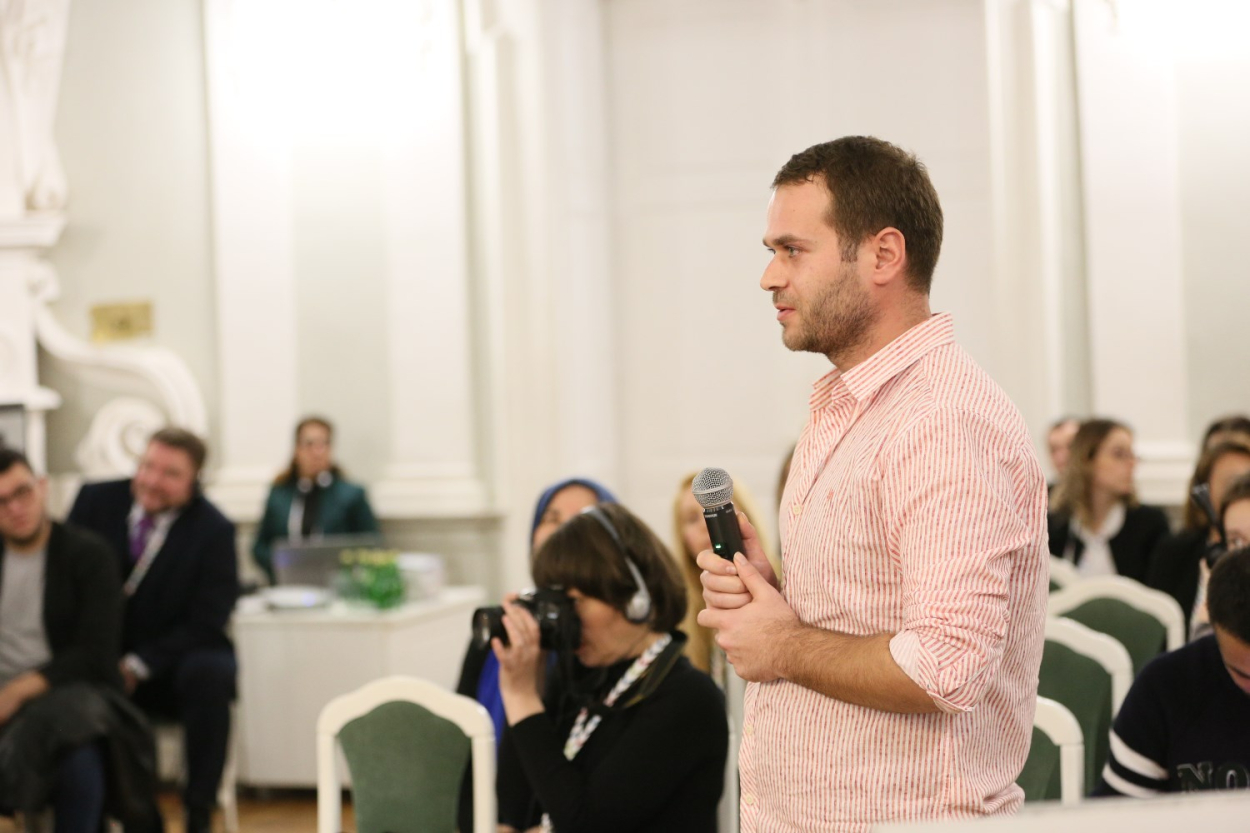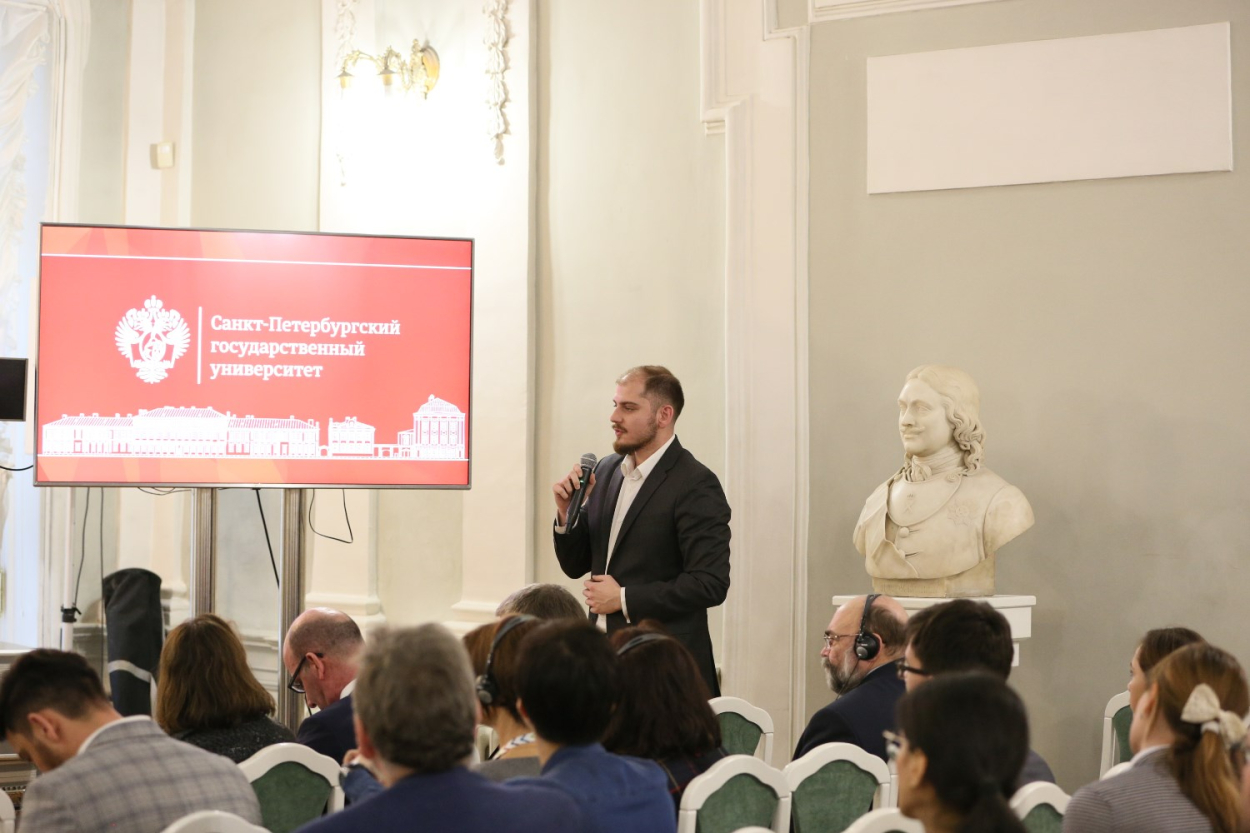Literary and cultural relations between Istanbul and St Petersburg have been discussed at the VIII St Petersburg Cultural Forum
The conference ‘Istanbul in Turkish and Russian literature’ has been held at St Petersburg University. Famous Turkish and Russian writers – İskender Pala, Hüseyin Kandemir and Ilya Boyashov – took part in the discussion. Associate Professor of St Petersburg University and the Director of the Centre for Contemporary Turkish Studies Apollinariia Avrutina served as the moderator.
Historian and professor of Istanbul University of Culture, İskender Pala, is one of the biggest stars in Turkey’s literary scene. He expressed the opinion that each city has its own distinctive moods, atmosphere, colours and, most importantly, its own historical memory. In this sense, Istanbul is a unique place because it is the former capital of three empires: Eastern Roman, Byzantine and Ottoman. İskender Pala revealed that for him Istanbul is a city that inspires feelings, devoid of criminal or political context. Half of Pala’s novels are imbued with its romance.
The development and strengthening of humanitarian relations with our partners from Turkey is of the utmost importance to us. And I would like to express my joy that Turkey has become a partner country at the St Petersburg International Cultural Forum. For indeed, the Embassy of the Republic of Turkey in Russia, the Consulate General in St Petersburg, and the Ministry of Culture and Tourism of Turkey provide their best support and assistance in the implementation of our projects.
Associate Professor Apollinariia Avrutina, Director of the Centre for Contemporary Turkish Studies at St Petersburg University.
The author of scholarly works on Dostoevsky and professor of Selçuk University, Hüseyin Kandemir, explained that Russian literature is not only very popular in Turkey but it is also becoming the main research object for Turkish scholars of world literature. Whereas Turkish authors, unfortunately, do not enjoy wide popularity in Russia, he noted. Istanbul of different eras is introduced to the reader by Turkish authors: the Christian Constantinople before its fall to the Ottoman Turks in 1453, and the Muslim Istanbul. Hüseyin Kandemir spoke in detail about how the city has been presented to Russian-speaking readers since the time of Old Russian literature till the present day. Thus, as early as at the beginning of the 12th century, the ‘Primary Chronicle’ (the Tale of Bygone Years), describes Prince Oleg’s campaign against Constantinople (Tsargrad). In 1514, the cycle of ‘Tales on the Taking of Tsargrad’ appeared, describing the conquest of Constantinople by the Ottoman Empire.
The event was held as part of the special programme presented by the Republic of Turkey at the VIII St Petersburg International Cultural Forum.
Hüseyin Kandemir also spoke about how Istanbul has been depicted by Russian authors. He touched upon the ‘Tsargrad Letters’ by Pavel Levashov and ‘A Turkish Gypsy’ by orientalist Osip Senkovsky. He also mentioned Ivan Bunin, who visited Istanbul before the Russian revolution and fled there in 1920 during the Russian Civil War. Indeed, this city is featured in several of Bunin’s works. As an author, Bunin was fascinated by the culture and Islam. Yet, it was Hagia Sophia that found a special place in his heart. Interestingly, at that time it was a functioning mosque – at present it is a museum. Hüseyin Kandemir also spoke about the short story collection ‘Istanbul and the Sun’ by Nadezhda Teffi.
This book was written shortly after the writer’s emigration. Teffi held a keen interest in the role of women in Turkish society. However, among the Russian intellectuals forced to leave their homeland there were those who failed to adapt to the new place of residence. Thus, Professor Kandemir singled out Arkady Averchenko, who compared Istanbul to ‘a very tough boxer,’ whose punches one must learn to take. Another famous author inspired by Istanbul was Joseph Brodsky. In his ‘Journey to Istanbul,’ he explores the past of this great city.
‘During the Soviet times, the role of Istanbul in the destinies of Russian emigrants was unjustly covered up. The vast majority of them came from St Petersburg, and for many the city was a safe refuge,’ the writer Ilya Boyashov agreed with Hüseyin Kandemir’s view. Ilya Boyashov undertook the task of tracing the historical and cultural connections between St Petersburg and Istanbul – the former capitals of bygone empires. He emphasised that strange though it may seem, these relations had been established long before St Petersburg was founded, namely in the 10th–11th centuries, when the Baltic Sea and Constantinople were connected through the ‘Trade Route from the Varangians to the Greeks.’
According to Ilya Boyashov, Orhan Pamuk, the Nobel laureate, in his novel ‘A Strangeness in My Mind’ seeks to explore the similarity between these two cities. As for Boyashov himself, he finds the similarities in the presence of an internal freedom and in complex relations with the modern-day capitals.
At the end of the discussion, Apollinariia Avrutina spoke about her experiences as a translator. According to her, their decade-long literary tandem with the editor Ilya Boyashov has been especially prolific. Not only has it served the purpose of familiarising the Russian reader with authors from Turkey, but it has also enabled the adaption of their literary works for the Russian-speaking audience.
‘Istanbul is featured in all literary works that we have prepared for publication together over these years. In Turkish literature of the late 20th – early 21st centuries, this city is becoming both a landscape and a character that influence the thoughts and actions of the heroes,’ noted the translator.




